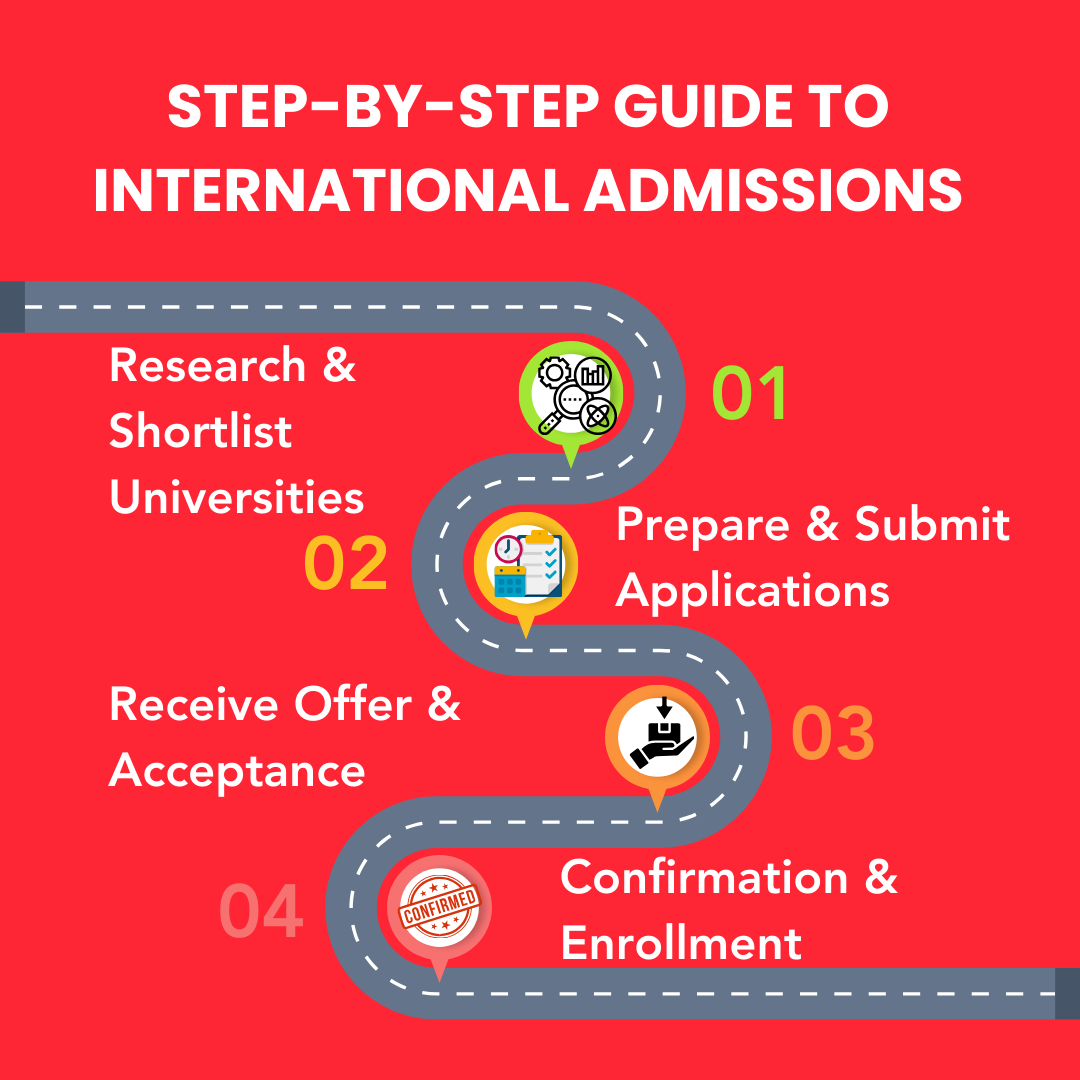Navigating the Visa Process: A Step-by-Step Guide for International Students
A visa is an official document that permits a person to enter a foreign country. Typically stamped or affixed inside a passport, it contains details about the purpose of the visit, length of stay, and any activity restrictions. A student visa is a non-immigrant visa that allows foreign nationals to enter a country temporarily for educational purposes.
Key Aspects of a Student Visa
Purpose
- Mainly for study: Enables students to enroll in recognized educational programs, from language courses to university degrees.
- Not primarily for work: Some countries permit limited part-time employment, but unauthorized work can lead to visa cancellation and deportation.
General Requirements
- Acceptance at an Educational Institution: Admission to a recognized school, college, or university is required. The institution provides an acceptance letter, a key document for the visa application.
- Proof of Financial Stability: Applicants must demonstrate sufficient funds to cover tuition, living expenses, and related costs via bank statements, scholarship letters, or sponsorship agreements.
- Valid Passport: The passport should be valid for a period extending beyond the intended stay.
- Health Insurance: Many countries mandate international students to have health insurance coverage.
- Additional Documents: Some countries require academic transcripts, recommendation letters, or a personal statement detailing study plans.
- Visa Application Form and Fees: Completion of the application form and payment of associated visa fees are necessary.
Student Visa Application Process
- Research: Study the specific student visa requirements of your chosen study destination.
- Gather Documents: Ensure all required documents are accurate and complete.
- Apply for the Visa: Submit your application online or via an embassy/consulate.
- Attend an Interview (if required): Be prepared to discuss your study plans, financial situation, and intent to return home after graduation.
- Visa Issuance: Upon approval, you receive your student visa.
SIU Dubai Student Visa Process
Studying at Symbiosis International University (SIU) Dubai simplifies the visa process. SIU Dubai assists students in obtaining a UAE student visa, ensuring a smooth transition.
Admission to SIU Dubai
- Meet Academic Requirements: Fulfill academic criteria and submit necessary documents.
- Application Review: SIU Dubai reviews applications and may conduct interviews.
Visa Application Process
- University-Sponsored Visa: SIU Dubai facilitates student visa applications through the General Directorate of Residency and Foreigners Affairs (GDRFA).
- Document Submission: Required documents include a valid passport copy, academic transcripts, an acceptance letter from SIU Dubai, proof of funds, and other documents per GDRFA guidelines.
- Visa Approval: SIU Dubai manages the application, but final approval rests with the GDRFA.
Post-Visa Formalities
- Visa Stamping & Emirates ID: Once approved, the student receives a residence visa stamp and an Emirates ID.
- Accommodation & Arrival Assistance: SIU Dubai supports students in settling into their new environment.
Comparison of Student Visas in Major Study Destinations
Feature | USA (F-1, M-1, J-1) | UK (Student Visa) | Australia (Subclass 500) | New Zealand (Student Visa) | Dubai (SIU Student Visa) |
Eligibility | Admission to SEVP-approved institution | Admission to UK-recognized institution | Admission to CRICOS-registered institution | Admission to NZQA-approved institution | Admission to SIU Dubai |
Work Rights (During Study) | 20 hrs/week (on-campus for F-1) | 20 hrs/week term-time, full-time in vacations | 48 hrs per fortnight | 20 hrs/week term-time, full-time in vacations | Limited (internships, special permits) |
Work Rights (After Study) | OPT (12-36 months for STEM) | Graduate Route (2-3 years) | Post-Study Work Visa (2-4 years) | Post-Study Work Visa (1-3 years) | No post-study work visa |
Dependents Allowed? | Spouse & children (F-2, no work) | Spouse & children (spouse can work for PG students) | Yes, spouse can work | Yes, spouse can work for some courses | Not typically allowed |
Visa Duration | Course duration + 60 days | Course duration + 4 months | Course duration + 1-3 months | Course duration + 3 months | 1-year renewable |
Processing Time | 2-4 weeks | 3-8 weeks | 1-3 months | 4-6 weeks | 2-4 weeks |
Financial Proof | Required for tuition + living | Required (~£1,023-1,334/month) | Required (~AUD 24,505/year) | Required (~NZD 20,000/year) | Required (~AED 30,000-50,000/year) |
Health Insurance | Mandatory | NHS surcharge | OSHC required | Required | Required |
PR Pathway | No direct PR | No direct PR | Skilled Migration Pathway | Skilled Migrant Category | No PR option |
Visa Options for Other Countries
- F-1 Visa: For academic studies, with Optional Practical Training (OPT) after graduation.
- M-1 Visa: For vocational courses, with no work permissions.
- J-1 Visa: For exchange programs and internships.
US Student Visa Overview
- A visitor (B) visa or Visa Waiver Program does not allow studying unless for a short, recreational, non-credit course.
- Apply to a SEVP-approved school and, upon acceptance, pay the SEVIS I-901 fee.
- The school issues Form I-20, required for the visa application at a U.S. Embassy/Consulate.
Application Process:
- Form DS-160 online.
- Upload a photo meeting U.S. visa requirements.
- Schedule and attend an interview (mandatory for most applicants aged 14-79).
- Pay the non-refundable application fee ($185, additional fees may apply).
- Gather required documents, including a valid passport, Form I-20, DS-160 confirmation, proof of funds, and academic records.
- Attend the visa interview and provide biometric fingerprints.
Entry & Stay:
- Entry permitted up to 30 days before program start.
- F-1 visa holders must leave within 60 days after program completion unless granted an extension.
- Visa does not guarantee entry; U.S. Customs and Border Protection makes the final decision.
Additional Information:
- Spouses and children may apply for F-2/M-2 visas.
- Working restrictions apply—review USCIS guidelines.
- Changes in status (e.g., employment, marriage) may require a new visa application.
- A valid visa in an expired passport remains valid for travel.
For more details, visit the U.S. Department of State and USCIS websites.
- Student Visa: Allows part-time work and leads to a Graduate Route Visa for post-study employment.
- Short-Term Study Visa: For courses up to 11 months, no work allowed.
Australia
- Subclass 500 Student Visa: Allows part-time work and post-study work through the Temporary Graduate Visa (Subclass 485).
New Zealand
- Student Visa: Allows part-time work and post-study employment under the Post-Study Work Visa.
Dubai (UAE)
- SIU Dubai Student Visa: University-sponsored visa, renewable annually, with limited work opportunities.
Key Takeaways
- Work rights and post-study options vary by country.
- Visa processing times differ; early application is crucial.
- Financial proof is mandatory in all destinations.
- PR pathways are limited for student visa holders but can be pursued through work visas in select countries.
Final Thoughts
Navigating the student visa process can be overwhelming, but with the right guidance, students can make informed decisions about their education abroad. SIU Dubai simplifies the UAE student visa process, offering dedicated support to international students. Whether considering the USA, UK, Australia, New Zealand, or Dubai, understanding visa regulations and compliance is essential for a smooth academic journey.
For further assistance, prospective students can consult their chosen institution’s admissions office or official immigration websites. Safe travels and best wishes for your academic success! Grab Your Chance! 30 Scholarships Available!



